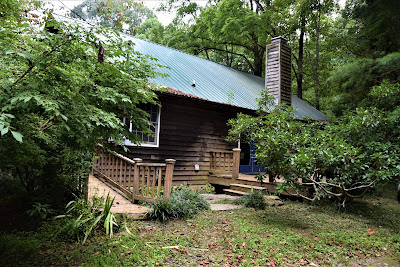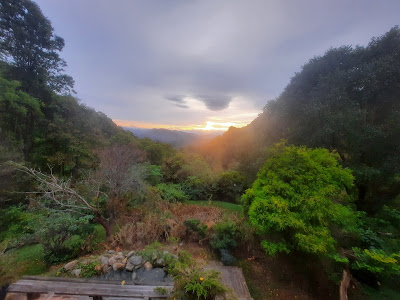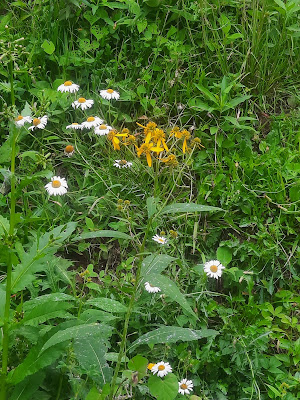Words and pictures from the author of And the Crows Took Their Eyes as well as the Elizabeth Goodweather Appalachian Mysteries . . .
Thursday, September 30, 2021
Saffron Crocus and Hardy Begonias
Wednesday, September 29, 2021
Josie and a Somewhat Disappointing Day
Tuesday, September 28, 2021
That Je Ne Sais Quoi
Now, while good tomatoes and fresh basil are available, this sandwich is a lunchtime favorite around here. Homemade pimento cheese on seeded bread with homemade mayo, thick slices of heirloom tomato, and a few leaves of basil for that je' ne sais quoi touch that lifts these humble ingredients to the stratosphere.
(With thanks to Vagabonde, who first suggested the basil.)
Monday, September 27, 2021
Available for Long Term Rental in December
The Gran House was built in 1987 and is nestled amid the fields and woods of our hundred acre family farm. The house boasts a spacious kitchen and dining area with an adjoining laundry room.
The dining area -- big enough for a large family table -- opens into the living room with its cathedral ceiling, bookshelves, stone fireplace, and French doors to the deck behind the house. There is a second room (perfect as a family room, media center, or office) with a door to the front porch where a porch swing and rocking chairs invite you to sit and watch the sunrise.
The master bedroom on the main floor has a walk-in closet and its own bath. There is a second bedroom and another bath. Upstairs is a large space which can be used as one or two bedrooms, a studio, an office, an exercise room or . . .?
The Gran House is twenty minutes away from Marshall, forty-five minutes from downtown Asheville. The school bus stops at our mailbox -- a quarter of a mile down the driveway. The house is heated with propane, supplied with well water, and there is A/C. An inground propane tank serves heater, stove, and hot water tank. The rent includes basic lawn care. High speed internet is available. We are two miles from the Barnard bridge -- the put in spot for white water paddling on the French Broad. The farm itself supplies hiking and birdwatching opportunities. Garden space is available, as is space to keep chickens (if you supply the coop.)
Pets are welcome as long as they are compatible with farm life -- there are cows and chickens -- and with the various dogs and cats in our secluded cove. No smoking permitted in the house.
Important--tenants must be vaccinated, if eligible. Rent is $1200 per month.Sunday, September 26, 2021
Miss Birdie's Visitor
She slowed at the sight of a shiny black car coming across Miss Birdie’s bridge. The driver, a dark-haired man who looked irritatingly familiar though she couldn’t call his name, threw up his hand and nodded before turning onto the hard road and disappearing around a curve.
Who was that? I know I’ve seen him
before but not here at Birdie’s. A salesman?. . . too late in the day. . . odd,
I thought I knew all of Birdie’s friends.
Miss Birdie was sitting on the front porch in one of her
red-painted rockers. Her head was bent, one hand covering her eyes, as if she
were praying, and she didn’t move as the jeep rattled across the plank bridge.
Closer to the porch, it seemed as if Miss Birdie was having a
conversation of some sort.
Oh, dear. She’s been so sharp for all these years.
. . I wonder… is she beginning to wander in her mind . . .
The old woman looked up as her visitor approached. “Why,
honey, how good to see you. Reckon you thought I was just a-talking to myself like
as if I had that Old Timers. Get you a chair and I’ll tell you what I was
studying on.”
She drew a long breath and stared off across the road to the
mountain beyond. “That feller was here just now. You might say he’s an old
friend.”
Her wrinkled face gathered into a bemused smile. “ Yeah, buddy, an old friend is just what he is. Jay Caron . . .Jay Caron. . .that’s
what he goes by now. I was saying it over and over so’s I wouldn’t forget.” Her
brow furrowed. “When first I knowed him, back when I was a little un, he was
Mr. Aaron, the peddler. And then, it was a few years back of this when Calven
was tangled up with that no good feller his mama was living with, me and
Dor’thy saw him up at that fancy place over beyond Burnsville--he was Jake
Aaron then and his hair was just as siiver-
The old woman shot a sharp look at her visitor. “No, I ain’t a
bit confused. When I was but little, when I was a young woman, and just now--hit’s
the same feller ever time, no, not his son nor grandson. You got to understand,
Mr. Aaron—Jay Caron-- ain’t like most folks. Names and looks might change but
it’s still him. With him time don’t matter. He holp me out of an awful fix back
before Luther and I wed and I’m right certain he had a hand in helping Calven
get away from that evil feller they called Pook.”
The old woman fell silent, her eyes distant, gazing into
memory. At last she roused herself and turned to speak.
“I been studying on
things my Granny Beck told me many a year ago. She said that time was . . . in
the old days the crossing betwixt one world and another was more frequent and
seldom remarked upon. Not much was thought of it if the Little People—them the
Cherokee called Yunwi Tsundi --sheltered a child for a night. . . or a year. .
. those of the other world walked among
us. And a man might walk in and out of Time.”
What is this? She doesn’t sound quite like herself.
She sounds like she’s dreaming or as if someone-something?—is speaking through
her.
Though heaven knows, some of those stories she’s told me up in the graveyard.
. .I wonder. . .
“What did he want? Now I couldn’t rightly say. He’s a nice
spoken someone and we had a little visit. He was asking about my arthuritis and
how was Dor’thy and Calven. Just a-chit-chatting, you know. He said he’d taken
a notion to see me again, something about. . .what was the word. . . mitzy ? . . .something
foreign. Then he hopped up and was off just before you come, saying he had
other visits to make before dark.”
“Now, I see that look on your face. Don’t you fret none—not about
that feller nor about my rememberer. I know what I know and Mr. Aaron ain’t never
brought me nothing but good. He's been what you might call a guardian
angel.”
The old woman stood, straightening up and taking a few
tentative steps. She stretched out a gnarled hand, flexing her fingers and rotating
her wrist.
“What’s more, honey, I believe that old arthuritis done gone
off with him. I feel right peart now.”
NOTE:Jake Aaron, or later Jay Caron, pops up several times in
my writing. He first shows up in Lydy’s tale (In a Dark Season) as a
pack peddler Lydie meets in an inn just before the Civil War.
In Day of Small Things—spanning almost a century in the
telling—Mr. Aaron’s a peddler with a mule, a mysterious someone with a car and
driver, and a retiree living in a gated community.
He’s in Crows—at the beginning and at the end.
And, in an unpublished short story I’ve written. he’s an
artist living in present day Marshall.
I don’t think I’m done with him yet . . . or maybe, he’s not
done with me.
And while I’m talking wo0-woo (paranormal stuff,) I’m reminded
of James Suttles who makes a present day appearance in In a Dark Season
and helps out Sim in Crows. Could be a descendant/ancestor thing but on
the other hand . . . (cue Twilight Zone theme music.)
Saturday, September 25, 2021
Friday, September 24, 2021
Thursday, September 23, 2021
Eats Reading and a Fantasy
Wednesday, September 22, 2021
Autumnal Equinox
To every thing there is a season, and a time to every purpose under the heaven:
A time to be born, and a time to die; a time to plant, and a time to pluck up that which is planted;
A time to kill, and a time to heal; a time to break down, and a time to build up;
A time to weep, and a time to laugh; a time to mourn, and a time to dance;
A time to cast away stones, and a time to gather stones together; a time to embrace, and a time to refrain from embracing;
A time to get, and a time to lose; a time to keep, and a time to cast away;
A time to rend, and a time to sew; a time to keep silence, and a time to speak;
A time to love, and a time to hate; a time of war, and a time of peace.
Ecclesiastes 3:1-8
Tuesday, September 21, 2021
Memory: John and Vicki Go to Buy Some Pigs
For years we raised pigs—not breeding them but buying two
young pigs in the spring, feeding them through the summer and fall, and
butchering them when the weather turned freezing—usually around January. When
we moved to Madison County in 1975, this was a common feature of the local
economy. Most of our neighbors raised feeder pigs; many cured the hams and sold
them, keeping the tenderloin, side meat, backbone, and making sausage from the
shoulders and trimmings for home consumption. Feeding pigs was a good way to
use up extra milk or buttermilk (and when you keep a milk cow, as was another
common practice that we adopted, there’s lots of extra.) It was also a fine way
to dispose of kitchen scraps.
Most farms back then had a little wooden building that looked
like an outhouse (most farms also had an outhouse) but was a ‘meathouse’, a
place to smoke or cure hams and bacon. Clifford, our local mentor memorably
once said of Richard Nixon, “I wouldn’t trust that man in my meathouse with a
muzzle.”
When we had just moved here, Clifford assumed we would need a
milk cow, a pair of feeder pigs, and a team of mules, and he made sure that we
got these necessary adjuncts to rural life. He taught us how to milk; his wife
Louise taught me to make butter. He helped John learn how to plow with Pete and
Molly, our red mules. And he showed John all about butchering pigs (the worst
part is shooting the pigs but that’s quick and the rest is very messy but
fascinating—all those guts fit in there so neatly and there’s no way you could
ever put them back.)
As the years went, Clifford and Louise moved away but pig butchering
remained a social event of the winter season—usually Super Bowl weekend. On
Saturday, John and a couple of his friends would do in the pigs, scrape off all
the bristles, and cut the carcasses into quarters, leaving the meat in the barn
to cool overnight.
Saturday always involved major amounts of wood fire, boiling
water, and Wild Turkey or Famous Grouse. All I had to do was cook a really good
lunch for the guys and maybe cut up the liver and kidneys to freeze for
catfood. And render the lard. If I’d followed the mountain tradition, I’d have
made liver mush and cooked the brains and boiled the heads for souse. But John
assured me he really didn’t want any part of that tradition.
The next day, usually Super Bowl Sunday, involved reducing the
quarter sections into slices, ribs, backbone, and sausage, then wrapping and
labelling same for the freezer. The guys would set up our big maple dining
table so they could watch the pregame stuff while they dissected the joints,
and I would be in the kitchen, grinding meat for sausage and wrapping pork
parts.
All the while out boys were growing up, we did this—the milk
cow and the pigs. But once the boys were off to school, keeping a cow and
raising pigs didn’t make economic sense. So, we stepped back from the traditional
way of life—as had many of our neighbors.
But that’s not what this story is about. This story is about
the very last time we bought pigs.
All the old farmers we used to buy pigs from had died or quit
keeping breeding sows, and there were no young pigs to be had in our area.
Finally, we saw an ad in the Asheville newspaper for feeder pigs, called the
number, and got directions to a place on the other side of Asheville. Off we
went in John’s pickup with a big metal dog crate in the back to put the piglets
in.
The directions led us to a semi-rural area with nice tidy
home, occupied, it seemed, mainly by Black families, but we couldn’t find the
exact place we needed. At last a man we asked directed us to a nearby clump of
woods where a derelict house trailer sat.
We got out and warily approached the trailer. It was
surrounded by rusting washing machines, ruined upholstered furniture, and other
assorted junk. It really didn’t look as if anyone could live there but as we
stood, waiting for inspiration, the sagging trailer door swung open and the
fattest man I’d ever seen leaned out. He was unshaven and his grimy white
undershirt failed miserably to reach his greasy trousers, leaving a great bulge
of pale belly flesh lolling free.
“What you want?” He eyed us suspiciously and we explained that
we were looking to buy some pigs.
“They ain’t my pigs—they belong to a colored feller lives over
there—up the road a ways. He’s at work now. You uns just go on back there and
get you two then come back and pay me. I can’t get around so good so I can’t take
you up there but you just follow that road there through the trees and you’ll
find ‘em.”
The road through the trees was a pair of deep ruts—so deep
that it was impossible to get out of them, impossible to avoid running over the
rumpled carcass of a dead speckled rooster that lay in one track. Amongst the
trees were several rusted-out school buses, more old appliances, some puzzling
blue plastic stuff, and other things, possibly nuclear waste, that we really
didn’t want to investigate.
At the end of the rut road was a series of pens, some with
flimsy tarpaper roofs, and mostly constructed of old pallets that were held
together with rusty wire. The little pigs—about sixteen of them—were in the leftmost
pen and we peered into the gloom to see a scrum of black piglets, milling about
in at least an inch of pig shit. (Pig shit, if you didn’t know, is about the
most obnoxious and long-lasting smell there is. Cow manure is pleasant in
comparison.)
But the piglets looked healthy, so John (my her0) crawled in
through the low door to attempt to catch a pig, trying to ignore the slippery,
stinking floor and to concentrate on the two largest pigs, about thirty
pounders. He made a desperate grab and snagged a candidate by the hind legs,
the accepted method for dealing with small pigs. Young pig squealed bloody
murder and in the next pen, The Mother Pig from Hell reared up her
six-hundred-pound bulk, put her front trotters on the flimsy boards separating
her from John, and glared at him over the partition. She was solid black,
red-eyed, and frothing (literally) at the mouth. Which mouth, by the way,
displayed wicked yellow two-inch ‘tushes’ (tusks) on either side.
Mama didn’t like what John was doing with her baby and the pen
shook with her disapproval. John, thinking quickly, opened the pen door and
thrust the little pig out at me—but I had jumped up in the back of the truck at
the first sight of Mama.
“Take the goddam pig!” he hollered. I did and he dived back in
with the piglets, grabbed a random second pig, and was back in the truck in
about thirty seconds, keeping a keen eye on the swaying and totally inadequate
wall between himself and the Black Sow of Doom.
Piglets secured in the crate, we backed back down the ruts,
over the rooster and past the appliance graveyard, paid the very fat fella, and
headed home.
“Well,” I said, wiping the pig shit off my hands onto my
jeans, “that’s as much fun as I’ve had in quite a while.”
“I’m just glad,” said John, “that your mother can’t see us
now.”
On the way home we stopped at a little country store to get
some cold drinks. John said I should go in as I had less shit on me, which was
true.
As I paid for our cans
of Coke, I became aware that all the grubby, tobacco-spitting old men lounging
around the place were looking at me real strange and sniffing meaningfully in
my direction.
I grinned as I climbed back into the truck. It had been a day
to remember.
Monday, September 20, 2021
Where Have All the Butterflies Gone?
Sunday, September 19, 2021
Dancing Through the Apocalypse


















































